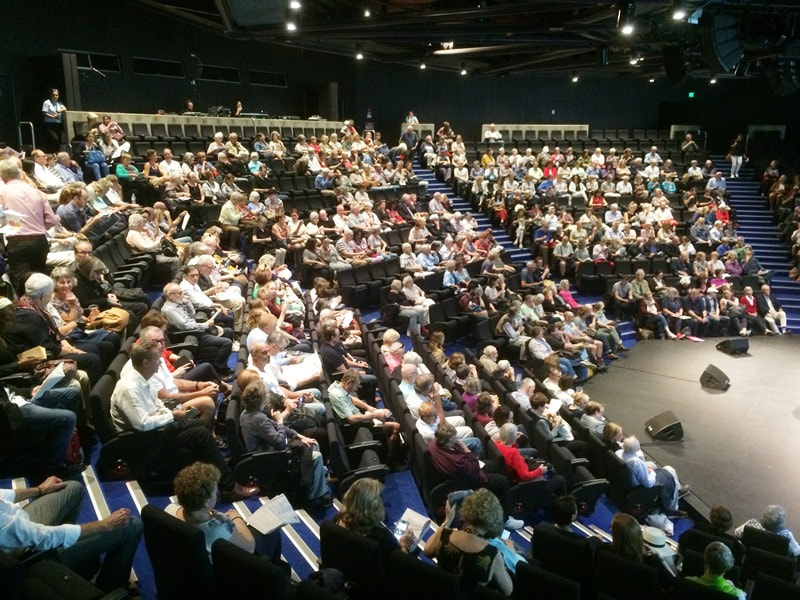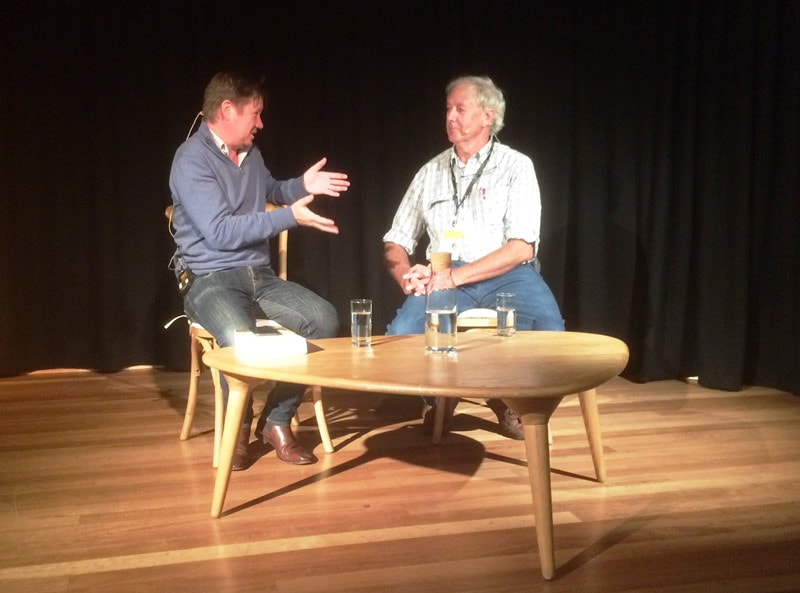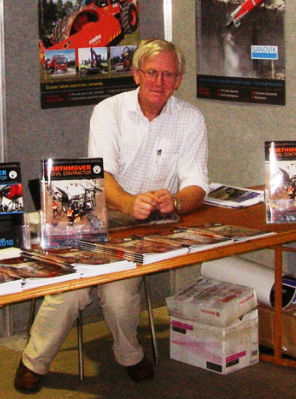There were not as many free sessions as previous years but most sessions were $20 for concession card holders. If there were unsold tickets at the start of the day on which a session was scheduled, prices were cut to $10 for everyone. Highly recommended.
Jane Harper talked about her third crime novel, apparently set in western Queensland. She had travelled there for research for the novel and was it seemed inspired. Her presentation was marred somewhat by endless "ums" and "ahs" which made it difficult for an audibly impaired bloke like me to hear.
The interviewer suggested she'd had it somewhat easier than first novelists, in getting into very successful print in just two years, by mining her writing course participants to the nth degree. She didn't deny that they had helped enormously.
To hear Charles Massy talk about the Call of the Reed Warbler, between 70 and 80 people crammed into a small sound studio at the Seymour Centre. One questioner asked if any agricultural college had invited Massy to talk to their students. But he said absolutely none. He added that he had tried three times to start a course with existing educational establishments to expound his ideas, but without success.
I had heard an economist at a previous unrelated session about China, say that tractors had cut employment in Australian agriculture from 30 per cent to about 3 per cent in about 70 to 80 years in the 20th century. Repeating that I asked Charles what he thought and did he not think that combining tractors and computers had made evaluating no till, controlled traffic cropping and refined inputs easier and less impactive on already fragile soils. Charles acknowledged that to produce the quantities of food necessary such combinations were essential but doing it better than it had been done in the past.
A session with Warren Mundine was poorly attended with only about 50 people present. Warren said he was no longer an active political figure in any formal position. But he did say he was a political animal and played a fairly active if behind the scenes role, particularly where indigenous issues were being discussed. At one point he said that indigenous people owned 40 per cent of Australia and claimed that would soon increase to 80 per cent. That prompted two questions, one of which was who would be controlling that 80 per cent. Warren had no real answer for that. I think the 80 per cent statement got the audience offside a little.
Amy Goldstein's book Janesville studied the effect to the southern states' town of that name of the closure of a General Motors car assembly plant in the town. As the major employer the effect was dramatic with many people travelling up to 500km to achieve similar work. But for those who didn't travel - some were just into their 50s - there was just no way to earn anything like they had previously from the few jobs available in Janesville. Goldstein researched the book in 2011, three years after the closure and aid many of the affected people had not worked in that period and she thought they would not really work properly again.
I had heard a lot of good reviews of The Trauma Cleaner and was keen to hear author Sarah Krasnostein. She is an American and interviewed the Melbourne woman/man, the subject of the book, who she found a an emergency services conference. The trauma cleaner, now dead, cleaned houses where there had been for example murders or someone had died and had not been found for a while. She also cleaned out houses where people had accumulated junk for years, situations I have had contact with in Benalla twice in the last year.
But the trauma cleaner had extraordinary ability to convince living hoarders to let her get on with her job as the occupiers often tried to put her off, saying "don't worry: I was just about to start doing it". Again that was an experience I had in both instances in Benalla.
On Friday May 4, although not part of the Writer's Festival, my sister and brother in law took me to see the play Still Point Turning, the life story of Catherine McGregor. Originally a man, he rose to the rank of lieutenant colonel in the Australian Army, before having a sex change operation. The play put on by the Sydney Theatre Company is based on interviews with McGregor and deals skilfully with the traumas he went through before becoming a woman. At the end the cast were acknowledging a woman in black in the audience and it turned out it was McGregor checking the play out, which she apparently does fairly regularly.
Just realised I had said nothing about probably the most memorable session with Dr Charlie Corke and his book Letting Go. It is all about letting go of life in an orderly way instead of being subjected to treatments you don't really want. Charlie is based in Geelong and he told the session that after every ward round, someone says "just don't let me go that way". He said for example that you might decide you'd draw the line at having a tracheotomy and then be confined to a nursing home. Also it might be determining a level of frailty at which you would not want to continue to live. Charlie said pneumonia used to be the old person's friend but with antibiotics it can be cured easily. However people making what he calls a living will, might rule out that intervention. (I have a cousin whose famous husband was in his 80s but had lost all cognitive function and was in 24 hour care. But he was revived when he got pneumonia. She was furious with the doctors but they had assumed she wanted him revived).
Altogether most rewarding as per usual.
David Palmer
Photographs - David Palmer




 RSS Feed
RSS Feed
